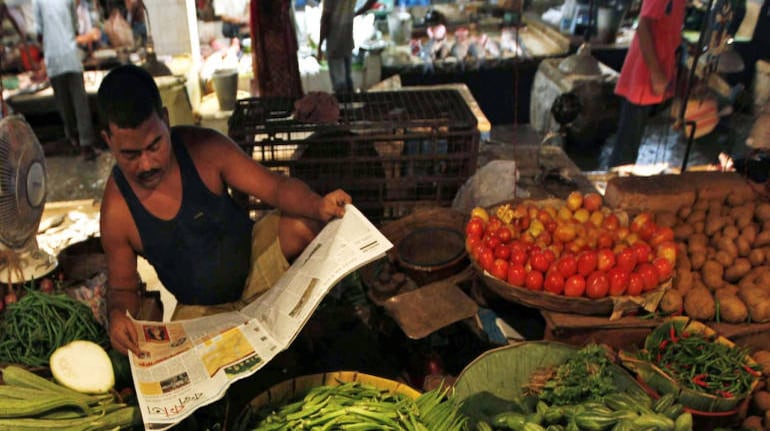



The government will release the retail inflation figure for June at 5.30 this evening. The data will be considered by the Reserve Bank of India in its next bi-monthly monetary policy meeting, scheduled for August 2-4.
The headline retail inflation rate is expected to be 7 percent in June, largely unchanged from 7.04 percent in May, according to the median of a Moneycontrol poll of 17 economists, with a sharp pick-up in vegetable prices likely nullifying the impact of the decline in prices of other food items.
"Cereal and vegetable prices are expected to remain elevated while some respite is expected in edible oil prices, reflecting a cut in duties and the lifting of Indonesia's export ban," said Swati Arora, an economist at HDFC Bank.
According to data from the Department of Consumer Affairs, prices of rice, wheat, and atta (flour) rose 0.7-2.1 percent in June from levels in May.
Among vegetables, tomato prices surged 20.6 percent month-on-month, while those of potato and onion were 9.9 percent and 2.3 percent higher. However, all five pulses—gram, tur, urad, moong, and masoor dal—for which the consumer affairs department collates data posted sequential price declines ranging from 0.2 percent to 0.6 percent.
Meanwhile, edible oil prices fell by 0.1 percent to 2.3 percent, with only the price of vanaspati rising 0.6 percent in June, while that of groundnut oil was largely unchanged.
Also read: Oil's latest slump: Goodbye inflation trade, hello recessionNon-food issuesOutside of food, excise duty cuts on petrol and diesel announced in late May should help lower fuel inflationary pressures. The retail price of petrol in the four major metro cities was 5.3-5.9 percent lower in June compared to May, while diesel prices were down 4.6-5.1 percent, according to data from the petroleum ministry's Petroleum Planning & Analysis Cell.
However, one factor that may not be as strong in June as it was in May is the favourable base effect. In May, a favourable base effect was the primary reason for inflation dropping 75 basis points to 7.04 percent after the general index of the CPI jumped 1.6 percent in May 2021 from April 2021.
In comparison, the general index rose by a more sedate 0.6 percent in June 2021 compared to May 2021. CPI inflation for June 2022 will be computed using the index for June 2021 as the base.
| ORGANISATION | JUNE CPI INFLATION ESTIMATE |
| L&T Financial Services | 6.53% |
| Bank of America Securities | 6.8% |
| YES Bank | 6.88% |
| Kotak Mahindra Bank | 6.89% |
| IndusInd Bank | 6.95% |
| Barclays | 7.0% |
| Deutsche Bank | 7.0% |
| Emkay Global Financial Services | 7.0% |
| ING | 7.0% |
| Societe Generale | 7.0% |
| HDFC Bank | 7.05% |
| IDFC First Bank | 7.07% |
| Standard Chartered Bank | 7.1% |
| ICRA | 7.2% |
| QuantEco Research | 7.25% |
| Motilal Oswal Financial Services | 7.3% |
| Sunidhi Securities | 7.32% |
Economists continue to be concerned about core inflation, or non-food, non-fuel inflation.
"The passthrough from elevated input costs and the recovery of demand are pushing inflation higher in various core goods segments, while fiscal intervention may offset some of that pressure," said Rahul Bajoria, chief India economist at Barclays. "Tax cuts on motor fuels should reduce transportation costs, though this could be partially offset by increases in telecom tariffs."
Core CPI inflation, as per its broadest definition, was 6.2 percent in May.
Policy implicationsAt 7 percent, June CPI inflation would be above the Reserve Bank of India's medium-term target of 4 percent for the 33rd straight month and outside the 2-6 percent tolerance range for the sixth consecutive month.
It would also mean average inflation for April-June would be 7.3 percent, 20 basis points lower than the RBI's forecast of 7.5 percent. However, undershooting the forecast is of little significance at this stage, with the central bank on track to miss its mandate.
The RBI's Monetary Policy Committee is deemed to have failed when average CPI inflation is outside the 2-6 percent tolerance band for three consecutive quarters. Inflation averaged 6.3 percent in January-March, is seen averaging 7.3 percent in April-June, and forecast by the RBI at 7.4 percent for July-September.
Economists expect the MPC to raise the repo rate when it meets August 2-4, after a 90-basis-point increase to 4.9 percent so far in FY23. The committee is expected to keep raising the rate so much so that it could end FY23 at 5.5-6 percent.
Separately, the statistics ministry will today release industrial production data for May, also at 5:30 in the evening.
Industrial growth, as per the Index of Industrial Production (IIP), is seen growing sharply around the 18-20 percent mark, economists said, buoyed by a favourable base effect.
In the year-ago period, the IIP was posting sharp sequential falls – from 145.6 in March 2021 to 115.1 in May 2021 – as the country was engulfed by the second wave of the coronavirus pandemic, leading to the re-imposition of restrictions on movement and activity in several regions. As such, the low base will boost industrial growth this year.
Discover the latest Business News, Sensex, and Nifty updates. Obtain Personal Finance insights, tax queries, and expert opinions on Moneycontrol or download the Moneycontrol App to stay updated!
Find the best of Al News in one place, specially curated for you every weekend.
Stay on top of the latest tech trends and biggest startup news.